Pressure Washing Sugarland Run
Top Exterior Cleaning in Sugarland Run
Receive multiple Pressure Washing quotes for your project today! Compare profiles, reviews, accreditations, portfolio, etc... and choose the best service.
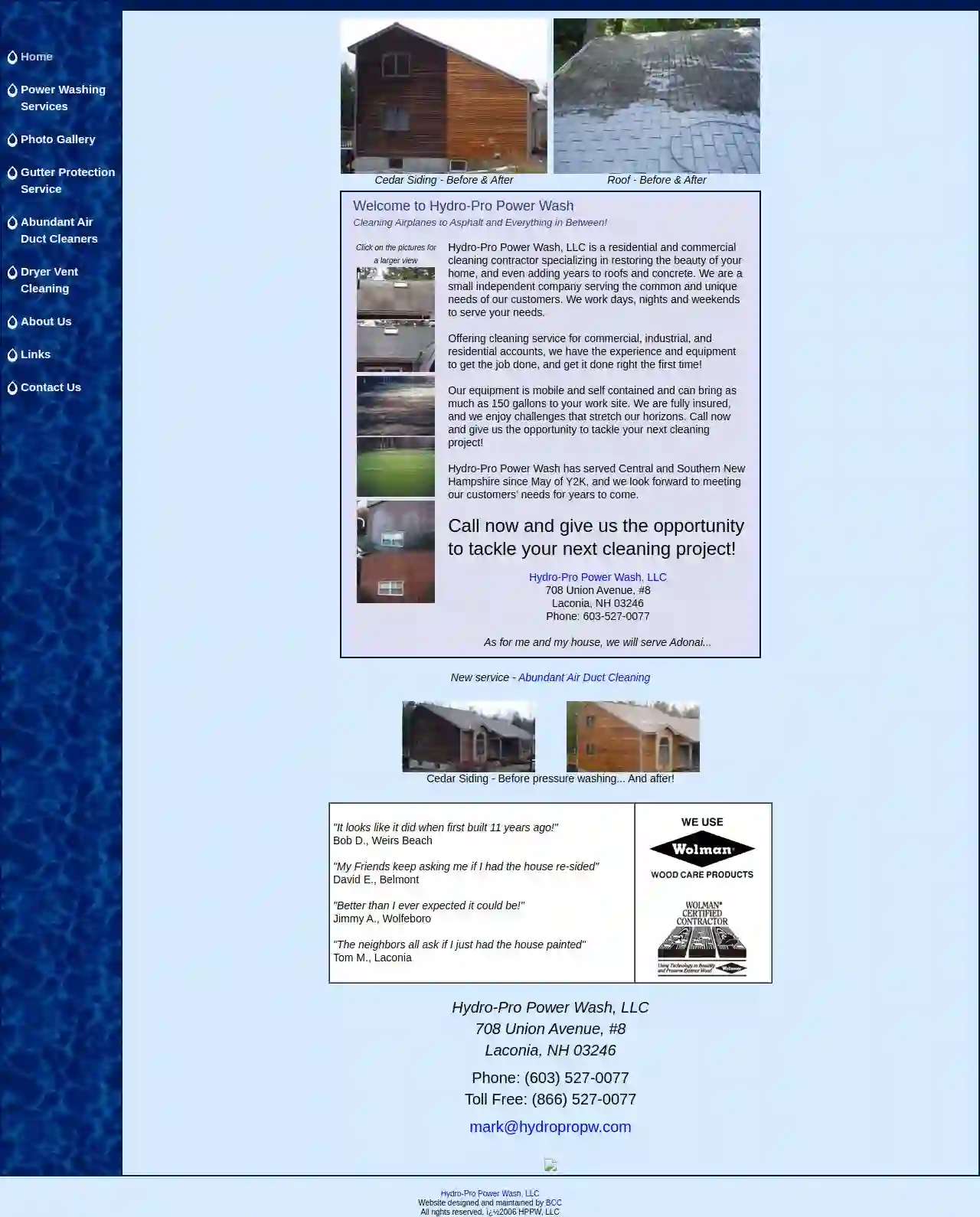
Hydro-Pro Power Wash, LLC & Abundant Air Duct Cleaners
Meredith, NH, 163 Meredith Center Road, 03253, USWelcome to Hydro-Pro Power Wash, a residential and commercial cleaning contractor specializing in restoring the beauty of your home, and even adding years to roofs and concrete. We are a small independent company serving the common and unique needs of our customers. We work days, nights and weekends to serve your needs. Offering cleaning service for commercial, industrial, and residential accounts, we have the experience and equipment to get the job done, and get it done right the first time! Our equipment is mobile and self-contained and can bring as much as 150 gallons to your work site. We are fully insured, and we enjoy challenges that stretch our horizons. Call now and give us the opportunity to tackle your next cleaning project! Hydro-Pro Power Wash has served Central and Southern New Hampshire since May of Y2K, and we look forward to meeting our customers' needs for years to come. Call now and give us the opportunity to tackle your next cleaning project!
- Services
- Why Us?
- Our Team
- Testimonials
- Gallery
Get Quote
Top Notch Pressure Washing & Cleaning LLC
52 reviewsUSTop Notch Pressure Washing & Cleaning LLC is a locally owned and operated business dedicated to providing high-quality cleaning services for a wide range of clients. We specialize in pressure washing, exhaust hood cleaning, and janitorial services, serving homes, restaurants, food trucks, schools, churches, medical facilities, office buildings, and more. We take pride in our commitment to customer satisfaction, ensuring that every client receives reliable and thorough cleaning services. With over 5 years of experience in the industry, we have built a reputation for excellence and trustworthiness. Our team of certified professionals utilizes top-quality products and techniques to deliver exceptional results. We are NFPA code 96 certified to inspect and clean all exhaust systems, ensuring compliance with safety standards. We offer free quotes and flexible scheduling options to meet your specific needs. At Top Notch Pressure Washing & Cleaning LLC, we understand the importance of a clean and healthy environment. Our mission is to provide our clients with peace of mind by delivering exceptional cleaning services that exceed their expectations. We are committed to using environmentally friendly products whenever possible and to minimizing our impact on the environment. Meet Jasmine D., the owner of Top Notch Pressure Washing & Cleaning LLC. Jasmine is a driven and passionate entrepreneur who is dedicated to providing her clients with the best possible service. She is a member of the National Fire Protection Association (NFPA) and the Women Impacting Public Policy (WIPP). Jasmine is also a certified NFPA Code 96 Inspector/Cleaner and SWAM certified. Her commitment to excellence and customer satisfaction is evident in every aspect of her business. Some of our valued clients include McDonald's, Hilton Garden Inn Hotel, HMR Properties, Sonic Drive In, and Dodges Southern Style Chicken. We are proud to serve the Newport News, Virginia community and surrounding areas.
- Services
- Why Us?
- Accreditations
- Our Team
- Gallery
Get Quote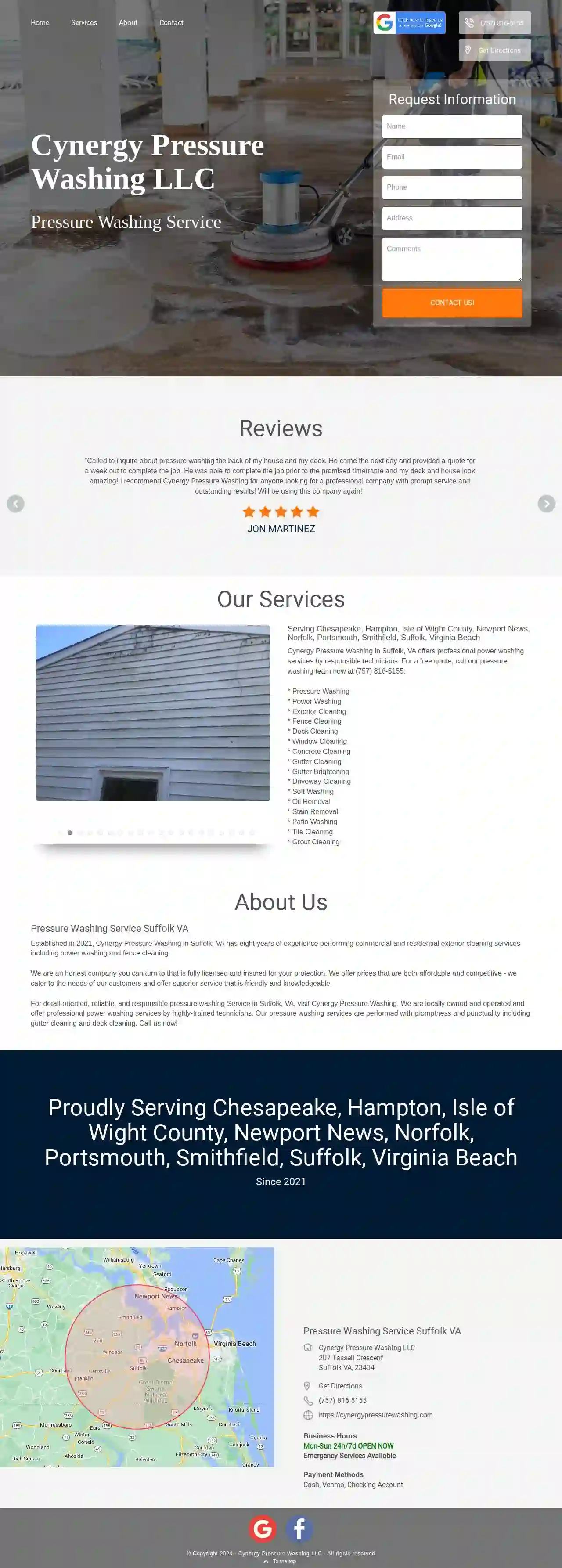
Cynergy Pressure Washing, LLC
4.610 reviews207 Tassell Crescent, Suffolk, 23434, USEstablished in 2021, Cynergy Pressure Washing in Suffolk, VA has eight years of experience performing commercial and residential exterior cleaning services including power washing and fence cleaning. We are an honest company you can turn to that is fully licensed and insured for your protection. We offer prices that are both affordable and competitive - we cater to the needs of our customers and offer superior service that is friendly and knowledgeable. For detail-oriented, reliable, and responsible pressure washing Service in Suffolk, VA, visit Cynergy Pressure Washing. We are locally owned and operated and offer professional power washing services by highly-trained technicians. Our pressure washing services are performed with promptness and punctuality including gutter cleaning and deck cleaning. Call us now!
- Services
- Why Us?
- Our Team
- Testimonials
- Gallery
Get Quote
Fired Up Power Washing LLC
5100 reviewsChesapeake, USFired Up Power Washing is based out of Chesapeake, Va and serves all of the Hampton Roads area. We are a local company that is owned and operated by firefighters. We are professional, reliable and honest. We provide free estimates. Our Services Residential soft washing We use a professional soft washing technique that not only kills algae and mold, its much safer on the exterior of your home Concrete Cleaning With pre and post treatments, along with our surface cleaners, we will get your driveways, pool patios and walkways looking brand new! Roof Washing Our professional roof soft washing kills and removes mold and mildew build up. Lengthening the life of your roof! Gutter Cleaning Fired Up manually takes out debris and bags them up. We flush out the gutters and down spouts before we leave to assure they are flowing properly Drain Jetting Fired Up specializes in exterior drain jetting. Gutter Drains, Floor Drains, French Drains and Ship Deck Drains GET IN TOUCH Contact us today for your FREE estimateWe always offer free estimates. We have competitive and fair pricing.Call or text us at 757-277-2980. GET IN TOUCH
- Services
- Why Us?
- Gallery
Get Quote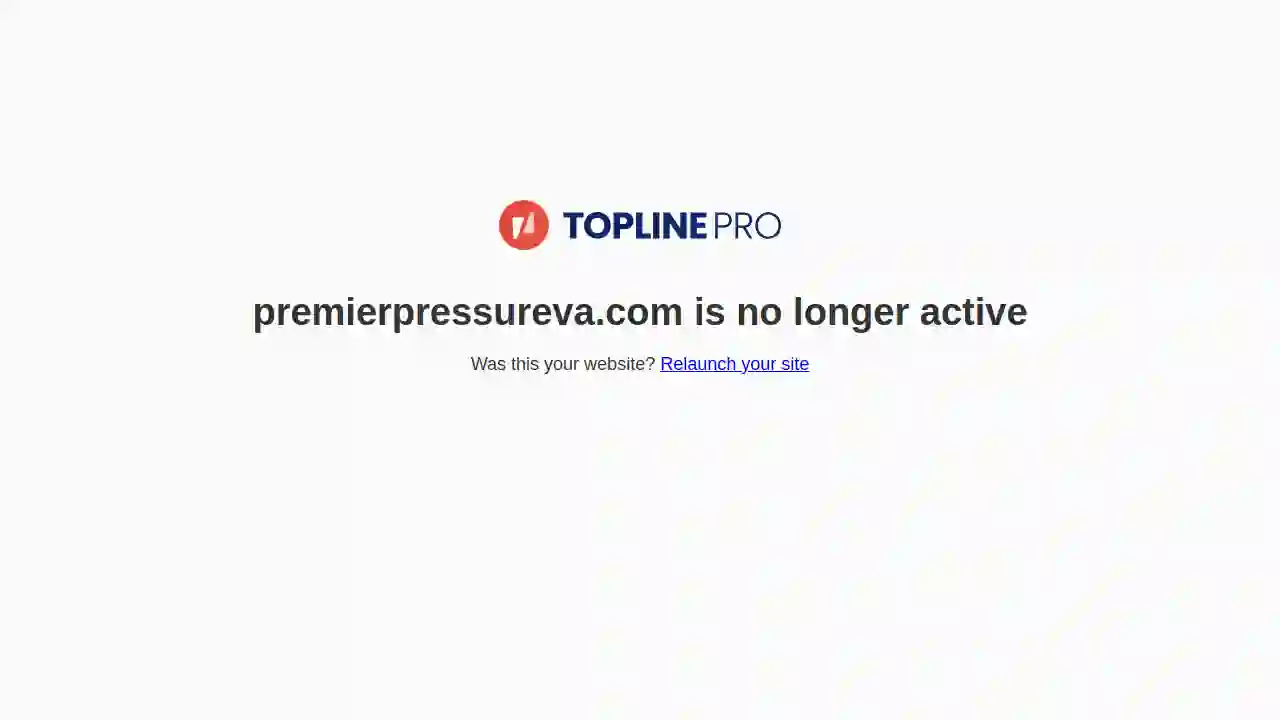
Premier Pressure Solutions
51 reviewsVirginia Beach, USPremier Pressure Washing is a locally owned and operated pressure washing company serving the greater Richmond, VA area. We specialize in residential and commercial pressure washing services, including house washing, deck cleaning, driveway cleaning, and more. Our team of experienced professionals uses the latest equipment and techniques to deliver exceptional results. We are committed to providing our customers with high-quality service at competitive prices.
- Services
- Why Us?
- Gallery
Get Quote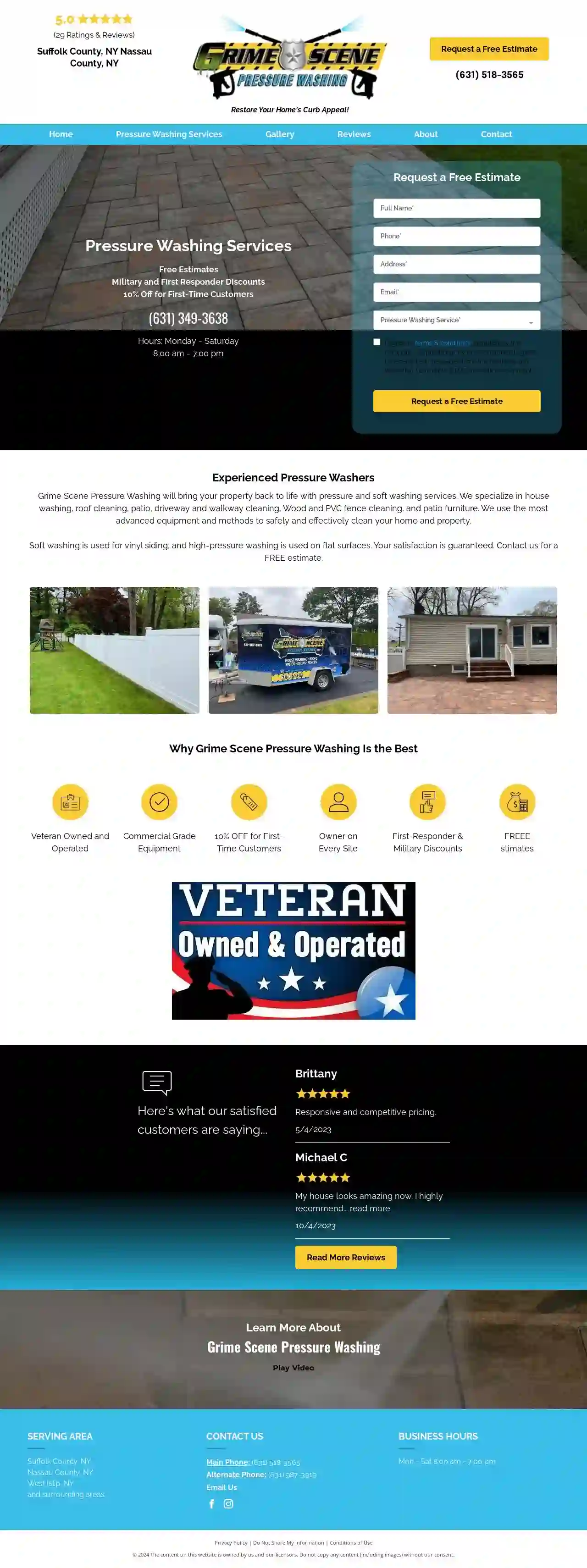
Grime Scene Pressure Washing
528 reviewsSuffolk, USGrime Scene Pressure Washing is a veteran-owned and operated business serving Suffolk County, NY and Nassau County, NY. We specialize in bringing your property back to life with pressure and soft washing services. Our services include house washing, roof cleaning, patio, driveway and walkway cleaning, wood and PVC fence cleaning, and patio furniture cleaning. We utilize the most advanced equipment and methods to ensure safe and effective cleaning for your home and property. We use soft washing techniques for vinyl siding and high-pressure washing for flat surfaces. Your satisfaction is guaranteed. Contact us today for a FREE estimate!
- Services
- Why Us?
- Testimonials
- Gallery
Get Quote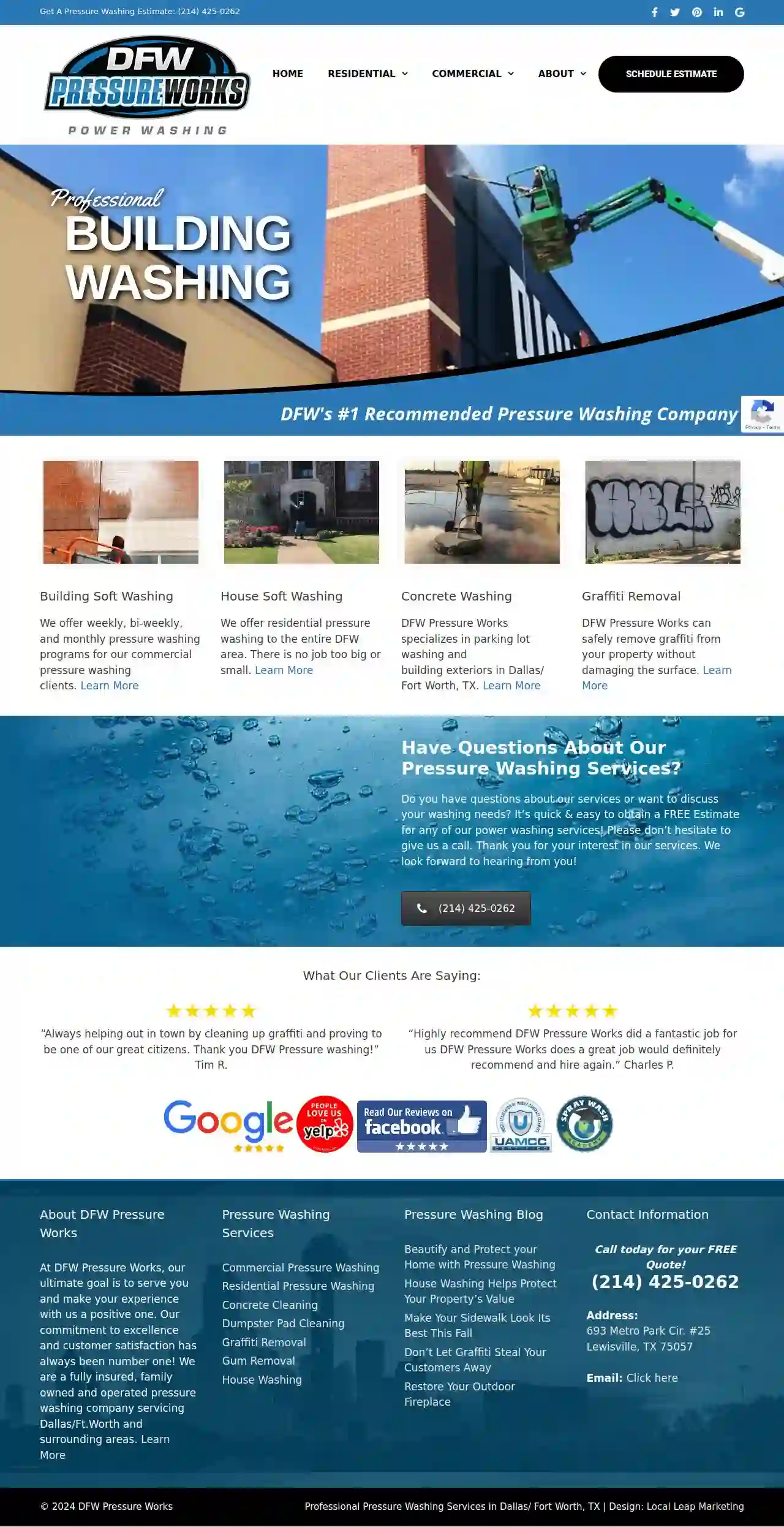
DFW Pressure Works
4.930 reviews693 Metro Park Cir #25, Lewisville, 75057, USAt DFW Pressure Works, our ultimate goal is to serve you and make your experience with us a positive one. Our commitment to excellence and customer satisfaction has always been number one! We are a fully insured, family owned and operated pressure washing company servicing Dallas/Ft.Worth and surrounding areas. We specialize in Commercial and Residential exterior cleaning. So call today and let us brighten up your investment!
- Services
- Why Us?
- Our Team
- Testimonials
- Gallery
Get Quote
Trinity Power Washing LLC
539 reviewsSalem, VA, 123 Main St, 24060, USTrinity Power Washing is a locally owned and operated company that provides expert power washing services in Salem, VA. We offer a wide range of services, including residential and commercial power washing, pressure washing, house washing, soft washing, roof cleaning, gutter cleaning, hauling services, and junk removal. Our team of experts has the knowledge and skill to get the job done right, every time. We pride ourselves on our reliable service, 5-star rating, and 100% satisfaction guarantee. Contact us today to get a free quote and schedule your appointment.
- Services
- Why Us?
- Testimonials
- Gallery
Get Quote
Johnson Power Washing
4.975 reviewsJohnson Power Washing, Chesapeake, VA, 23320, USJohnson Power Washing is a professional pressure washing company based in Chesapeake, VA. We offer a range of services including pressure washing, house washing, roof cleaning, driveway cleaning, fence cleaning, fence restoration, concrete cleaning, gutter cleaning, patio cleaning, deck cleaning, pool deck cleaning, retaining wall cleaning, and gazebo cleaning. Our team is fully accredited, insured, and certified, and we offer a 2-year warranty on our roof cleaning services. We are also a top-rated company on Thumbtack and have been accredited by the Better Business Bureau. Our goal is to provide exceptional service and customer satisfaction to our clients. Contact us today to schedule your appointment and get a free estimate.
- Services
- Why Us?
- Accreditations
- Gallery
Get Quote
Star City Pro Wash
5104 reviewsRoanoke, USStar City Pro Wash is your one-stop shop for all your exterior cleaning needs in Roanoke, VA. We offer a wide range of services, including pressure washing, house washing, roof cleaning, window cleaning, gutter cleaning, and commercial washing. Our team of experienced professionals is dedicated to providing high-quality service and exceeding your expectations. We use the latest equipment and techniques to ensure that your property is cleaned safely and effectively. We are fully insured and licensed, so you can rest assured that your property is in good hands. We also offer competitive pricing and free estimates. Contact us today to schedule your free estimate!
- Services
- Why Us?
- Gallery
Get Quote
Over 60,241+ Janitorial Services onboarded
Our janitorial service providers operate in Sugarland Run and surroundings!
CleaningMatch has curated and vetted the Best Janitorial Businesses in Sugarland Run. Find a top & reliable business today.
Frequently Asked Questions About Pressure Washing
- Size of the Area: Larger areas generally cost more to pressure wash than smaller ones.
- Type of Surface: Different surfaces require different pressure levels and cleaning solutions, which can affect pricing.
- Condition of the Surface: Heavily soiled or stained surfaces may require more time and effort to clean, impacting cost.
- Accessibility: Difficult-to-reach areas may require specialized equipment and increase costs.
- Additional Services: Services like pre-treating stains, applying protective coatings, or mold removal may incur additional charges.
- Hard Surfaces: Pressure washing is often successful in removing graffiti from hard surfaces like brick, concrete, or metal.
- Delicate Surfaces: For delicate surfaces like wood or painted surfaces, a gentler approach using specialized graffiti removal products and techniques may be necessary.
- Professional Graffiti Removal: For stubborn or extensive graffiti, consider hiring a professional graffiti removal service. They have specialized equipment, cleaning solutions, and experience in dealing with various types of graffiti.
- Soft Washing: Soft washing is generally recommended for wood decks as it uses lower pressure and specialized cleaning solutions to safely remove dirt, mildew, and algae without causing damage.
- Lower Pressure Setting: If using a pressure washer on a wood deck, use a lower pressure setting (around 1500 PSI) and a wide-angle nozzle (25-40 degrees).
- Maintain Distance: Hold the nozzle at least 12 inches away from the deck surface to prevent etching or splintering.
- Professional Pressure Washing: If you're unsure about pressure washing your deck safely, hire a professional pressure washing company with experience in cleaning wood surfaces.
- Wear Protective Gear: Wear safety glasses, closed-toe shoes, and long pants to protect yourself from flying debris and water spray.
- Never Point the Nozzle at Yourself or Others: High-pressure water can cause serious injuries. Always point the nozzle away from yourself, others, and pets.
- Use Caution on Ladders: If working on a ladder, ensure it is stable and secure. Avoid overreaching or leaning too far to one side.
- Be Mindful of Electrical Hazards: Keep water away from electrical outlets, wiring, and appliances.
- Follow Manufacturer's Instructions: Always read and follow the pressure washer manufacturer's instructions for safe operation and maintenance.
How much does pressure washing cost?
To get accurate pricing, request quotes from multiple pressure washing companies. Provide details about the size and type of surface, its condition, and any additional services you require.
Can pressure washing remove graffiti?
If you're attempting DIY graffiti removal, always test the cleaning solution and pressure washing technique on an inconspicuous area first to avoid damaging the surface.
Can pressure washing damage my deck?
By using the right cleaning method and precautions, you can effectively clean your wood deck without causing damage and prolong its lifespan.
What are some safety precautions to take when pressure washing?
Prioritizing safety when pressure washing protects you and others from potential injuries or accidents.
How much does pressure washing cost?
- Size of the Area: Larger areas generally cost more to pressure wash than smaller ones.
- Type of Surface: Different surfaces require different pressure levels and cleaning solutions, which can affect pricing.
- Condition of the Surface: Heavily soiled or stained surfaces may require more time and effort to clean, impacting cost.
- Accessibility: Difficult-to-reach areas may require specialized equipment and increase costs.
- Additional Services: Services like pre-treating stains, applying protective coatings, or mold removal may incur additional charges.
To get accurate pricing, request quotes from multiple pressure washing companies. Provide details about the size and type of surface, its condition, and any additional services you require.
Can pressure washing remove graffiti?
- Hard Surfaces: Pressure washing is often successful in removing graffiti from hard surfaces like brick, concrete, or metal.
- Delicate Surfaces: For delicate surfaces like wood or painted surfaces, a gentler approach using specialized graffiti removal products and techniques may be necessary.
- Professional Graffiti Removal: For stubborn or extensive graffiti, consider hiring a professional graffiti removal service. They have specialized equipment, cleaning solutions, and experience in dealing with various types of graffiti.
If you're attempting DIY graffiti removal, always test the cleaning solution and pressure washing technique on an inconspicuous area first to avoid damaging the surface.
Can pressure washing damage my deck?
- Soft Washing: Soft washing is generally recommended for wood decks as it uses lower pressure and specialized cleaning solutions to safely remove dirt, mildew, and algae without causing damage.
- Lower Pressure Setting: If using a pressure washer on a wood deck, use a lower pressure setting (around 1500 PSI) and a wide-angle nozzle (25-40 degrees).
- Maintain Distance: Hold the nozzle at least 12 inches away from the deck surface to prevent etching or splintering.
- Professional Pressure Washing: If you're unsure about pressure washing your deck safely, hire a professional pressure washing company with experience in cleaning wood surfaces.
By using the right cleaning method and precautions, you can effectively clean your wood deck without causing damage and prolong its lifespan.
What are some safety precautions to take when pressure washing?
- Wear Protective Gear: Wear safety glasses, closed-toe shoes, and long pants to protect yourself from flying debris and water spray.
- Never Point the Nozzle at Yourself or Others: High-pressure water can cause serious injuries. Always point the nozzle away from yourself, others, and pets.
- Use Caution on Ladders: If working on a ladder, ensure it is stable and secure. Avoid overreaching or leaning too far to one side.
- Be Mindful of Electrical Hazards: Keep water away from electrical outlets, wiring, and appliances.
- Follow Manufacturer's Instructions: Always read and follow the pressure washer manufacturer's instructions for safe operation and maintenance.
Prioritizing safety when pressure washing protects you and others from potential injuries or accidents.